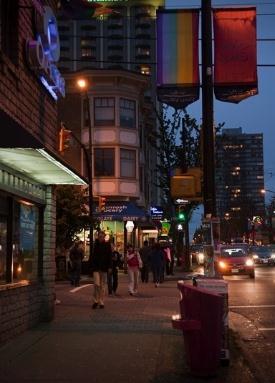Apart from a reference to the Davie Village as a traditional queer “hub,” the City of Vancouver’s new 110-page West End profile contains little detail about the gay community’s presence and history in the area.
In contrast, the profile lists the languages spoken in the area and other demographic details such as age, number of children, family and household size, and employment.
Asked about the scant detail regarding the gay community, the city’s assistant director of planning says, “We’ve heard loud and clear that the gay village is extremely important to West Enders.”
One of the things that’s important to people is strengthening the gay village’s identity, he says, whether it’s more Pride flags or gay businesses or just a better sense of the spirit of the area.
In addition to conducting regular consultations for the new West End community plan they’re developing, Kevin McNaney says city planners have visited the Davie Village’s gay clubs at night to talk to people who frequent the area.
“I don’t think we’ve ever done a count as to how many people identify as gay or transgender or LGBTQ who are in the West End,” McNaney says, when asked if the city has a sense of the density of queer population in the area. He says planners relied on Statistics Canada census data to compile the profile.
Vision Vancouver Councillor Tim Stevenson says that it’s still “very early days” and that the West End community plan is a work in progress.
“There is going to be more discussion with various groups. The LGBTQ advisory group with Ron Stipp and Barb Snelgrove are going to be dealing directly with the planning department.”
Tackling specifics is the next step for planners, he adds. “They’re going to have huge input from our community and from the committee.”
Stevenson says he’s had meetings with city planners and they’re “very aware” that the gay village is a top priority.
McNaney confirms that the city is working with the LGBTQ advisory committee and the West End BIA, among others, to improve the area, renew its vibrancy and support the nighttime economy.
“There was definitely some interest in additional outdoor patios; they wanted to see a more diverse type of retail. But in general there is a lot of pride in the Village, and they wanted to retain that; they didn’t want it to become a generic street,” McNaney says.
“We want to make sure that a queer presence remains vibrant and visible in the Village. This is why we have stepped in as one of the subcommittees of the city hall LGBTQ advisory committee,” Snelgrove says.
She says the plan is to speak to a wide range of people, organizations and businesses to canvass their opinions about what they envision for the area.
Asked if the subcommittee has a sense yet of what the community wants prioritized, Snelgrove says it’s still in the information-gathering stage.
“The queer community has a voice within city hall with the advisory committee, and here’s an opportunity for us to do what we were chosen to do,” she says.
For her part, Snelgrove says she’d like to see a vibrant, people-oriented Village that’s a meeting place for community.
“We want to retain that feel. At the same time, you have to think in terms of businesses and what is best for the community moving forward to keep it economically vibrant, and visually vibrant, and vibrant in its peoples,” she says.
Snelgrove says advisory committee members have spoken with city planners and community members about ways to increase the visibility of Davie as a queer hub, but she reiterates that the consultation is still in its initial stages.
McNaney says the city is planning to hold a “walk shop” on Davie Street in February to explore ideas for the Village’s future with the community. “We’ll tell people to meet at a common place and we’re going to walk with our planning team and hear from people about what they want to see to keep the Village thriving.”
McNaney says he’s aiming to bring the new West End community plan to city council for adoption next fall.


 Why you can trust Xtra
Why you can trust Xtra


